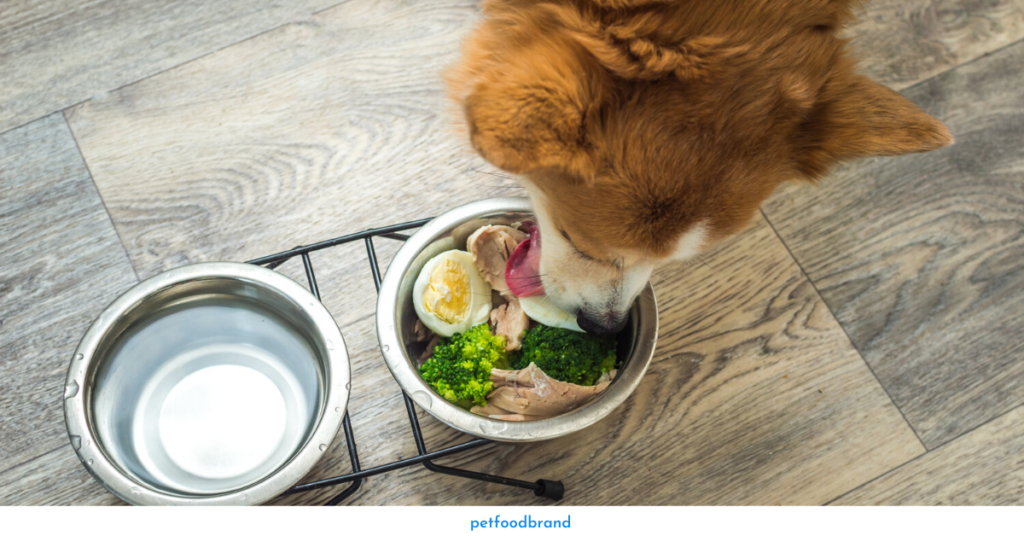Yes, dogs can eat eggs. They are full of healthy protein, vitamins, and fatty acids. Make sure to feed cooked or boiled eggs as raw or undercooked eggs can be a source of Salmonella.
When it comes to nutritional value, eggs have a long list of benefits for your dog. One egg offers 75 calories, 6g protein, 5g fat, and 0.6g carbohydrates.
Health benefits
- Eggs are a nutrition powerhouse for dogs as they contain iron, fatty acids, protein, vitamin A, vitamin B12, Folate, and Selenium.
- Iron is a mineral that dogs need to perform important functions including transporting oxygen in the hemoglobin of red blood cells and driving energy throughout your dog’s cells.
- Omega-3 & omega-6 are two types of essential fatty acids that provide a variety of health benefits. Dogs should have a variety of these nutrients in their diets to maintain healthy, shiny skin and strong immune systems.
- Dogs need protein to keep their bodies growing and repairing. It helps with muscle growth and also provides support for your pet’s immune system.
- Vitamin A has many benefits for your pet’s health. It can benefit their eyes, skin, and the organs that it supports. It also helps to strengthen their immune system.
- Vitamin B12 is important for your dog’s nervous system and brain functions, as well as for the formation and growth of its blood cells.
- Dogs need trace minerals like selenium to stay healthy and cannot synthesize them. Selenium regulates general metabolism and is an antioxidant that promotes DNA synthesis, reproduction, and immune system health.
Risks
- Owners who feed raw eggs to their dogs could also face the risk of contracting or transmitting an infection called salmonella to their dogs or themselves. It is often spread through raw eggs and many other foods that have been exposed to bacteria. Symptoms may include fever, diarrhea, nausea, vomiting, and uncontrollable shaking.
- Incorporating raw eggs into a pet’s diet can lead to biotin deficiency as the egg whites contain avidin which blocks the absorption of biotin in your body. This could interrupt healthy skin, digestion, and more.
- Eggs can spoil quickly. The older they get, the more likely they are to have harmful bacteria and make your pup sick.
- There is a possibility that your dog may be allergic to eggs. The symptoms include sneezing, swelling, and lethargy. If this is the case, take her to the vet as soon as possible.
- Most dogs are not allergic to eggs. If you suspect that your dog might be allergic to eggs, it’s important to talk to your vet about the best treatment and whether or not you should keep him on a special diet, watch for symptoms or have him tested.
How to feed an egg to a dog?

- Find the eggs that came from the free-range chicken as they have the healthiest nutritional profile.
- Make sure to wash properly before cooking or boiling.
- Don’t EVER cook your eggs with oil, butter, salt, seasonings, spices, or additives. It doesn’t matter if your pooch prefers them sunny side up, scrambled, or hard-boiled. Just initially cook the eggs without additives and serve your pup.
- Vets recommend 1 egg per day for larger dogs. For smaller dogs, eating half an egg every day is enough.
Can dogs eat eggshells?
Yes, dogs can eat eggshells. Egg shells contain calcium. They can provide your dog with more nutrients and also help those dogs having a difficult time chewing bones. But make sure that the eggs had been cooked properly to rule out the chances of salmonella.
Are egg whites good for dogs?
Yes, given that egg white contain a lot of protein, it is good for dogs. However, make sure to cook it properly before feeding. Most of the risks are associated with raw egg white. Otherwise cooked or boiled egg including the egg shell, egg white, and egg yolk is safe for a dog.

Ankita is a passionate pet lover and head of content at Pet Food Brands. With her extensive knowledge and research, she provides pet owners with top-quality information on dog food and nutrition. Her dedication to improving the lives of dogs makes her a leading voice in the industry.




